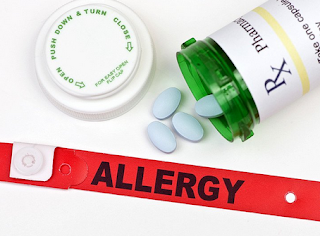Drug allergies disease
Drug allergies are a condition when a person experiences a variety of symptoms after obtaining a certain drug, whether it is drinking or injections.
Some risk factors make one tend to be prone to drug allergies, namely:
- An allergic history, such as food allergies
- History of drug allergies in families
- Long-term use of the drug, high doses, or repeated use
- The presence of certain diseases associated with drug allergies, such as HIV
Causes of drug allergies
Drug allergies occur because the body is misidentifying which are ' opponents ' and which are ' comrades '. Medications that enter or are exposed to the body are considered harmful substances and need to be fought, as does the body fight viruses and bacteria.
Drug allergies are more common when individuals consume certain medications for example:
- Penicillin
- Sulfa class Antibiotics
- Anti-seizure
- Aspirin, ibuprofen and non-steroidal anti-pain medication
- Chemotherapy drugs
Drug Allergies Diagnosis
Diagnosis of drug allergies is determined based on complaints after using certain medications. At the initial examination, the doctor will conduct a complete and thorough medical interview on the symptoms, as well as the type and number of medications recently consumed or worn to the skin. Also, there will be a physical examination to determine the range of allergic symptoms.
This Diagnosis is confirmed with various additional checks, such as:
- Skin Test
The skin test is done by injecting a small extract of the drug into the skin layer. When the results of this injection turn into redness and swelling, a test of SUFFM is read as a positive drug allergy. If there is no reaction, drug allergies can not be removed as well. It must be seen in advance of other test results.
- Blood screening
Blood screening is performed to exclude the possibility of illness or other conditions in which the effect resembles drug allergies, such as viral infections.
Symptoms of drug allergies
Mild symptoms of drug allergies such as reddish skin generally occur in a matter of hours to days. However, the symptoms that are classified as shortness of breath can occur within 1 hour after exposure to the drug.
Various symptoms that can occur include:
- Red rash on the skin
- Hives
- Fever
- Swelling in the eyes and body
- Shortness of breath
- Aqueous nose
- Itchy and juicy eyes
In severe cases, drug allergies can lead to fatal reactions called anaphylaxis. The sign of a person experiencing anaphylactic reactions is as follows:
- Shortness of breath suddenly
- Great abdominal pain
- Very fast Heartbeat
- Convulsions
- Loss of consciousness due to drastic declining blood pressure
Drug allergies Treatment
Drug allergies can be remedied by avoiding the consumption of drugs that are the author and other drugs that are potentially allergic because of the resemblance of basic ingredients. Always ask the Doctor Who handles, the type of medication to be avoided.
If an allergic reaction has already occurred, the medications that can be administered generally include the introduction of antihistamines to suppress the body's allergic response.
Anaphylactic reactions should be treated immediately with the drug epinephrine or adrenaline to avoid fatal consequences. Life-threatening anaphylactic reactions are the toughest effects or complications of drug allergies.
The action of desensitization of the drug can be done by doctors to reduce the level of allergic sensitivity experienced. Gradually, drugs that potentially cause allergies will be given. Starting with the lowest dose. When there is no reaction, slowly it will be increased in dose. However, desensitization should be carried out under the strict supervision of a physician considering an allergic reaction can occur at any time.
Drug allergies Prevention
Prevention of drug allergic reactions can be done by knowing exactly the type of allergic trigger medication. Always inform the medical personnel every time an allergic person has medication. This is done for the medication to be administered then free of ingredients that can trigger an allergic reaction.
Also, a person who has drug allergies is expected to wear an ' allergic bracelet ' that lists the types of drugs that should be avoided. In case of emergency, the bracelet can provide information at any time that prevents a patient from dangerous allergic reactions.
